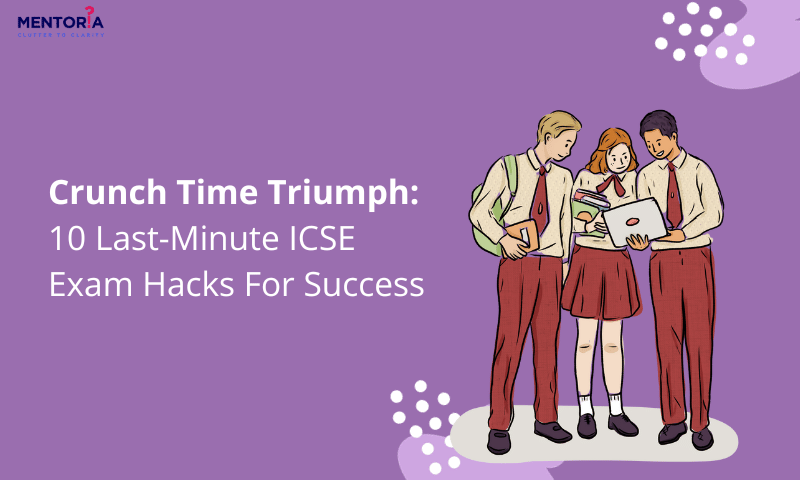Crunch Time Triumph: 10 Last-Minute ICSE Exam Hacks For Success

As the clock relentlessly counts down to the ICSE exams, picture this: you’re armed with 10 powerful last-minute tips, ready to stride into that examination hall with the swagger of a seasoned pro. The anxious flutter in your chest? It’s about to transform into the confident beat of a champion. Whether you’ve been diligently preparing or the syllabus decided to surprise you, these strategic gems are your secret weapons to not just survive but conquer your ICSE exams. So, grab your notes, your favourite pen, and get ready to turn your last-minute sprint into a glorious victory lap.
Exam Strategies
Mnemonic Magic
Mnemonics are like the secret codes of memory enhancement. They turn mundane information into catchy phrases, acronyms, or rhymes that are easy to remember. For instance, if you’re studying the order of planets from the sun, “My Very Educated Mother Just Served Us Noodles” represents Mercury, Venus, Earth, Mars, Jupiter, Saturn, Uranus, and Neptune.
These memory aids work because they tap into your brain’s natural inclination to remember patterns and associations. They’re especially handy for lists, sequences, or vocabulary words. Mnemonics are versatile and can be as creative as you like, making them a fun way to remember even the most complex material. So, get creative and invent your own mnemonic devices to make learning a blast!
Artistic Annotations
If you have artistic inclinations, turn your study notes into visually engaging materials. Use doodles, sketches, or diagrams to represent key concepts. Associating visual metaphors with abstract ideas helps you visualise and understand complex topics. This method adds an element of creativity to your study routine, making learning more enjoyable and memorable. For instance, if you’re studying human anatomy, draw a colourful diagram of the circulatory system. Label the parts with vibrant markers and add tiny heart-shaped notes to remember key functions. This artistic touch brings life to your notes and makes them memorable.
Mind Mapping Marvels
Mind maps are your artistic brain’s best friend. They’re visual representations of information that help you connect ideas and concepts in a more dynamic way than traditional note-taking. Start with a central topic or concept in the centre of the page and branch out with related subtopics, using colours and images to distinguish them.
Say you’re diving into World War II history. Start your mind map with “WWII” at the centre. Branch out with sections like “Causes,” “Major Battles,” and “Consequences.” Use different colours for each branch and connect related events with arrows. This visual map helps you grasp the bigger historical picture.
The beauty of mind maps is that they encourage you to think creatively and holistically. They allow you to see the bigger picture and how different elements relate to each other. This can be particularly useful for subjects like history, where you need to understand cause-and-effect relationships, or for organising complex scientific theories.
The ‘Reverse’ Study Technique
The ‘Reverse’ study technique flips your traditional study routine on its head. Instead of starting with the easy, comfortable topics, begin with the most challenging ones. When your mind is at its freshest and most alert, tackle those tough subjects head-on. This strategy ensures that you allocate your peak mental energy to the areas where you need it most. As you conquer the challenging material, you’ll gain confidence and a sense of accomplishment that can carry you through the rest of your study session. Suppose you’re tackling a challenging maths topic like calculus. Instead of easing into it, dive right in. Begin with those intricate integration problems when your mind is freshest. As you conquer them, you’ll build momentum and find the rest of your study session more manageable. Here are the steps of the reverse study technique:
- Identify the most challenging topics. This could be done by asking your teacher, looking at past test scores, or simply reflecting on your own strengths and weaknesses.
- Start your study session with the most challenging topics. This will ensure that you are fresh and alert when you tackle them.
- Break down the material into smaller chunks. This will make it less daunting and more manageable.
- Use active learning strategies, such as practice problems, quizzes, and flashcards. This will help you to solidify your understanding of the material.
- Reward yourself for your progress. This will help you to stay motivated.
The ‘Revisiting’ Technique
Instead of passively rereading your notes, actively test your memory. After reviewing a section of your notes, close the book and try to recall key points from memory. Let’s say you’re studying a dense chapter on cell biology. After reading a section, close the book and recall key processes like mitosis and meiosis. Testing your memory actively enhances your retention. This active recall strengthens your memory and improves your ability to recall information during exams. This technique also mimics the exam environment where you can’t rely on having your notes in front of you, preparing you for the real deal.
Flashcard Finesse
Flashcards are a tried-and-true study tool, but with a twist, they become a potent weapon in your exam arsenal. Create flashcards with questions or prompts on one side and concise answers or explanations on the other. As you go through the flashcards, test yourself and answer the questions before flipping the card.
This active recall method reinforces your memory and strengthens your grasp of key concepts. It’s a highly efficient way to review a large amount of material in a short time. Plus, you can carry these flashcards with you and use them for quick review during spare moments, like waiting for the bus or standing in line.
The Power Of Narration
Explaining concepts aloud as if you’re teaching them to a friend is a potent learning technique. This method forces you to articulate your understanding of a topic, helping you identify gaps in your knowledge. It also reinforces your memory by engaging your auditory and verbal faculties. Try to make your explanations engaging and clear. Consider adding real-life examples or analogies to make the information more relatable and memorable.
Environment Experimentation
Changing your study environment from time to time can stimulate your brain and prevent study fatigue. If you’re used to studying in your room, try a different setting like a library, coffee shop, or even an outdoor park. Each environment offers a unique sensory experience, keeping your mind alert and engaged. Here are tips on how to change your study environment to prevent study fatigue:
- Choose a different location. If you’re used to studying in your room, try a different setting like a library, coffee shop, or even an outdoor park. Each environment offers a unique sensory experience, keeping your mind alert and engaged.
- Vary the lighting. Natural light is best for studying, but if you can’t study near a window, try using different types of artificial lighting to create a more stimulating environment.
- Change the temperature. If you’re always studying in the same room, the temperature can start to feel stale. Try studying in a different room or even outside to change things up.
- Add some plants. Plants can help to improve the air quality and create a more relaxing environment.
Sleep And Memory Magic
Quality sleep is essential for memory consolidation. While studying is crucial, your brain needs adequate rest to process and retain information effectively. Aim for at least 7-9 hours of sleep per night, especially during the days leading up to your exams. During deep sleep, your brain organises and stores newly acquired information, ensuring that you wake up with a refreshed memory and a sharper mind.
Healthy Snacking
Your brain needs proper nourishment to function optimally. Snack on brain-boosting foods like blueberries, almonds, or dark chocolate. These foods are rich in antioxidants and nutrients that enhance cognitive function and memory. Staying hydrated with water or herbal teas also helps maintain focus and alertness during study sessions. A well-nourished brain is better equipped to absorb and retain information, giving you an edge during your exams.
Ready, Set, Succeed With Mentoria
As you gear up to conquer your ICSE exams, remember that you have the potential to excel and reach your academic goals. These last-minute tips have equipped you with strategies to manage your time wisely, stay focused, and approach your exams with confidence. With dedication and determination, you can achieve the results you aspire to.
But, if you ever find yourself in need of additional guidance or support, Mentoria is here for you. Our team of experienced educators and mentors understands the challenges students face during the exam season. We offer personalised coaching, study plans, and expert advice to help you navigate your academic journey successfully.
With Mentoria by your side, you can address specific areas where you need improvement, receive valuable study resources, and gain insights into effective exam strategies. Whether it’s subject-specific assistance, exam stress management, or career guidance, Mentoria has you covered.









